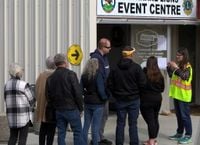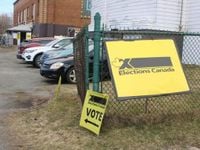As the federal election approaches, voters in Canada are gearing up to cast their ballots with advance voting opportunities already underway. Starting on April 18, 2025, early voting has opened across various ridings including Courtenay-Alberni and Sydney-Glace Bay, providing residents the chance to participate ahead of the general election day on April 28, 2025.
In Courtenay-Alberni, advance voting began on Friday and will continue through April 21 from 9 a.m. to 9 p.m. Voters are reminded they must cast their ballots at their assigned polling places, a change from some provincial elections where voting can occur at any location. The advance polling station for the Alberni Valley is the Alberni Athletic Hall, located at 3727 Roger St. in Port Alberni. Voters can confirm their assigned polling station by checking their voter information card, visiting elections.ca, or calling 1-800-463-6868.
For those unable to vote during the advance polling days, Elections Canada also offers an option to vote by mail using the special ballot process. The deadline for applying to vote by mail is April 22, and voters must return their marked ballots by election day on April 28. The Elections Canada office in Port Alberni is situated at 4994 Argyle St. and is open daily, allowing residents to vote in person until the mail-in deadline.
Meanwhile, voters in Metro Vancouver experienced long lines on the first day of advance voting. Reports indicated that some individuals waited over two hours to cast their votes, particularly in areas like Vancouver's West End and Langley. One voter, Barb Stoll, expressed her hope that the turnout signals a desire for change, stating, "Hopefully it's a sign of things to come, and a sign of things for change." Such high turnout reflects a growing trend where early voting is becoming increasingly popular as voters seek to avoid potential delays on the official election day.
During this advance voting period, registered voters can cast their early ballots at their designated polling stations between 9 a.m. and 9 p.m. from April 18 to 21. Unlike provincial elections, voters must adhere to the polling station assigned to them, which is detailed on their voter information cards received by mail. For those who want to avoid long lines, Elections Canada suggests voting during off-peak hours, typically after 4 p.m.
Voter turnout is expected to remain high, as Richard Johnston, a political science professor at the University of British Columbia, noted that advance voting has become more popular in recent years. He explained, "People are not necessarily in town on Election Day. People are worried about queues on Election Day," highlighting a trend that has been observed globally.
In the ridings of Sydney-Glace Bay and Cape Breton-Canso-Antigonish, advance polls will also be open this Easter long weekend, allowing residents to vote on April 18 (Good Friday), 19 (Holy Saturday), 20 (Easter Sunday), and 21 (Easter Monday) from 9 a.m. to 9 p.m. Voter information cards sent out by Elections Canada provide crucial details on polling locations, which may differ from those on election day.
Françoise Enguehard from Elections Canada emphasized the importance of these voter information cards, stating, "People who are registered to vote have, or will shortly receive, a voter information card that will give them all this information, including advanced poll and general poll voting locations — they may be different." This ensures that all voters are informed and prepared to participate in the electoral process.
For those requiring additional assistance, such as language or sign language interpretation, the voter information card includes contact details for support services. Voters are encouraged to reach out to the provided numbers before the April 22 deadline for mail-in voting applications.
To register and vote, residents must be Canadian citizens, at least 18 years old on election day, and be able to prove their identity and address. Acceptable forms of identification include a driver’s license or any government-issued ID with a photo, name, and current address. Alternatively, voters can present two pieces of ID, with one showing their name and address, or declare their identity in writing and have someone vouch for them.
As the election date draws closer, anticipation and engagement among voters continues to grow, with many eager to exercise their democratic rights. The increase in advance voting participation is seen as a positive development in the Canadian electoral landscape, reflecting a commitment to civic duty and the importance of having a say in the governance of the country.
With various options available for casting votes, including in-person advance voting, mail-in ballots, and the accessibility of Elections Canada offices, Canadians are encouraged to take advantage of these resources and ensure their voices are heard in the upcoming federal election.






